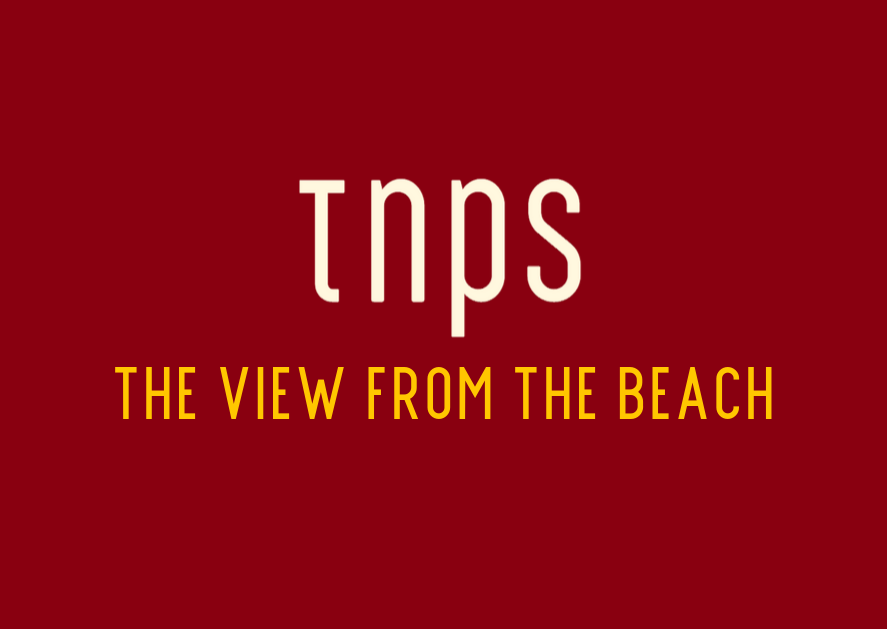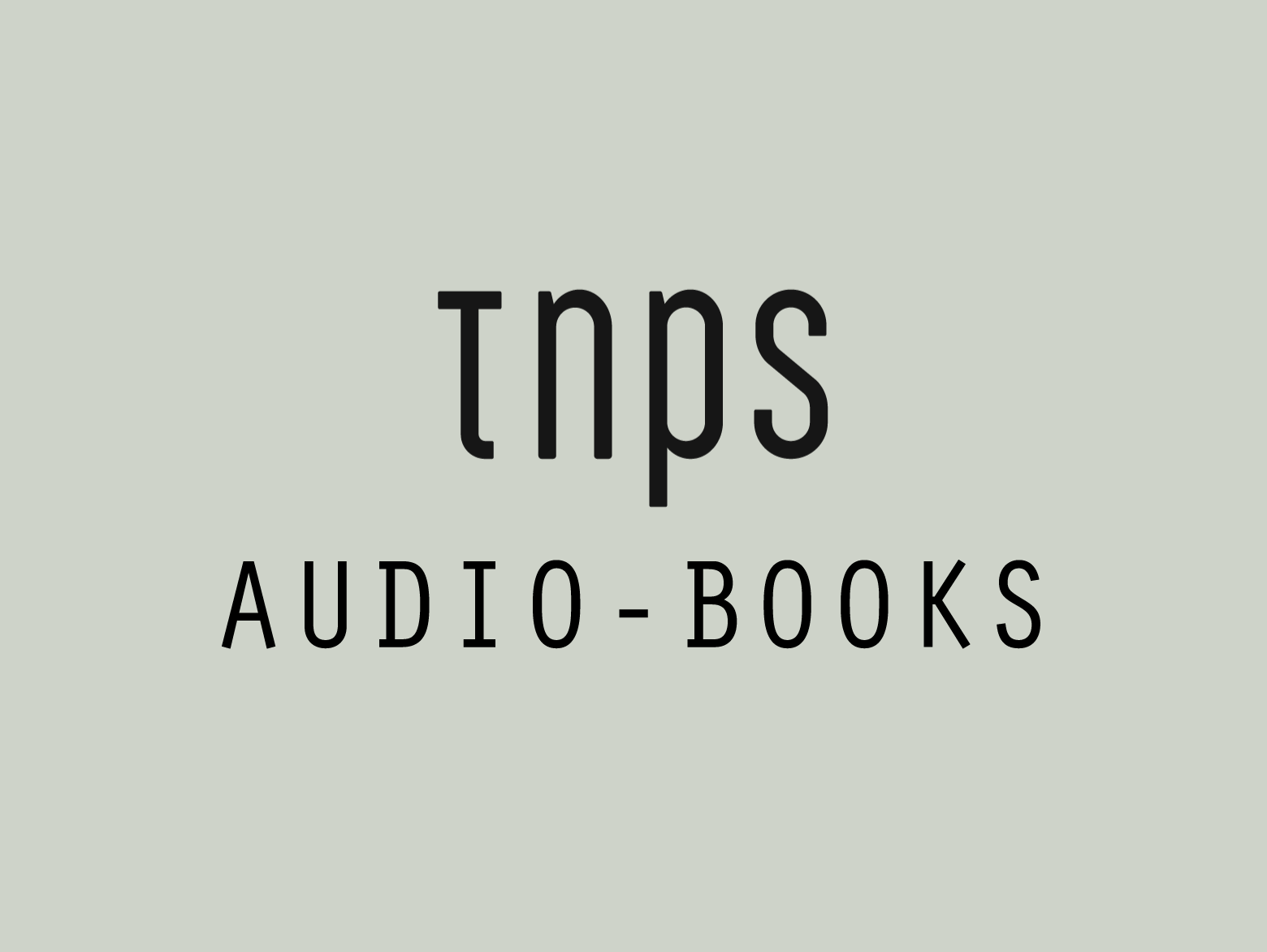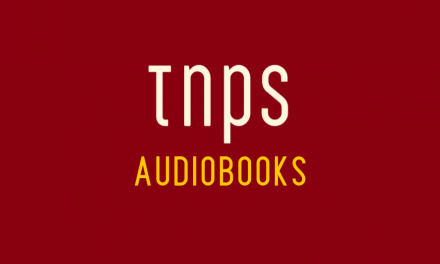There is no “free” involved. You pay money and then get a choice of content and benefits. It’s a bundle. A package deal .Just like Amazon Prime.
So it’s all but official: Spotify has grown the US audiobook market, has bumped Apple down to third place, has vindicated Nihar Malaviya ditching the PRH Dohle Doctrine, and has Spotify opponents, including Amazon-owned Audible and the UK’s Society of Authors, desperately claiming Spotify is giving away audiobooks for free.
There’s still a lot we don’t know since the last TNPS op-ed on this topic.
But what we do now know, even at this early stage, is that the ripples predicted by TNPS back in August 2020 are now washing ashore, and while not quite a tsunami, we are seeing a seismic shift in the global publishing landscape.
A decade of anti-subscription rhetoric ripped up
Former PRH CEO Markus Dohle, arch-opponent of the S-Squad – Spotify, Subscription, Swedes – will no doubt have his head buried deep in the sands of the Arabian Desert to avoid seeing a decade of anti-subscription rhetoric ripped up by his successor, Nihar Malaviya.
And I do mean ripped up. This is what PRH had to say about the Spotify deal: “Penguin Random House is excited to have our titles included in the Premium catalog. We’re thrilled by this exciting opportunity to bring our authors’ works – and voices – to Spotify’s 220 million paid subscribers.”
Contrast that official statement from PRH on these historical comments from PRH leadership:
In 2022 Markus Dohle was in a US court explaining to a judge that subscription was evil incarnate, a much bigger threat than PRH buying Simon & Schuster, and that subscription would destroy bricks and mortar stores within three years.
Or this from Dohle in 2021:
“When it comes to subscription, I am convinced that in the long run it is not good for author income, it is not good for retail.”
Or this from PRH UK CEO Tom Weldon, in full gatekeeper costume, back in 2014.
“We have two problems with subscription. We are not convinced it is what readers want. ‘Eat everything you can’ isn’t a reader’s mindset. In music or film you might want 10,000 songs or films, but I don’t think you want 10,000 books.”
Bizarrely, Weldon, who clearly had issues with counting to two as well as understanding subscription, is still in charge of PRH UK. His muttered expletives, when he heard Malaviya had singled out PRH UK to be among the first to sign up with Spotify, are not on record, but can be guessed at.
Details? Who cares about details?
But the true scale of the seismic shift has yet to be revealed. Royalties have yet to be paid, and the Luddite Squad, led by the UK Society of Authors’ thankfully outgoing-CEO Nicola Solomon, is desperately clutching at straws as it tries to dismiss early reports that the Spotify deal is benefiting the industry.
Solomon had already dug a deep hole for herself by unequivocally stating back in October 2023 that the Spotify deal would have a “devastating effect” on authors, while admitting that actually she had not a clue about what the deal involved. Details? Who cares about details when there’s a juicy soundbite to be had?
Fast forward to February 2024 and Solomon is telling The Bookseller that authors were “still waiting to see the effect on author incomes and whether these are real additional sales or simply take market share from Amazon.”
Which begs the question why Solomon is so worried about Amazon’s well-being. Clearly Solomon would prefer an Amazon-controlled market with its credit model that favours only the highest priced audiobooks, to one where there is healthy competition and more audiobooks are sold across the board.
But Solomon’s love affair with Amazon doesn’t stop there. Solomon whines: “We aren’t surprised to see figures like (quoting Spotify CEO Daniel Ek) ‘nearly a 3,000% increase in sales since joining our Premium catalogue’ as the Premium catalogue is free. We remain concerned at the lack of clarity about these deals and urge all authors to ask questions of their publishers Spotify streaming deal.“
This “lack of clarity” of course is complete BS from Solomon. Curiously the US equivalent of the Society of Authors, the Authors Guild, managed in December 2023 to put together a reasoned and rational report on what was known about the Spotify deal with US publishers.
But hey, let’s not let rationality and research get in the way of a good soundbite.
What Solomon might reasonably have said was that the 3000% increase in sales being reported by Spotify is a meaningless number because a) we don’t know the base line, but b) we do know the baseline must be very small because previously the Big 5 publishers were not signed with Spotify.
Handing out free audiobooks like Santa Claus on steroids
Just to be clear on the former point: If Spotify was selling 100 audiobooks and is now selling 3000 that would constitute a 3000% increase, but would be nothing to get excited about. If it was selling 10,000 and increased 3000% to 3 million, that would be something. But we just don’t know. Percentage increase and decrease statements are meaningless without baselines.
Equally, Solomon might have said, “Only 3000? You’re giving away audiobooks for free and only a 3000% increase? How pathetic!“
That would at least make sense, if it were true that Spotify was handing out free audiobooks like Santa Claus on steroids, as so many Spotify and subscription opponents are gleefully asserting. The problem being of course, that Spotify is not offering audiobooks for free, no matter how many times the Spotify opposition repeats this endearing fallacy.
Just ask Bob Carrigan, CEO of Audible, which is owned by Amazon. Not that you might have guessed that listening to Carrigan whine about Spotify taking unfair advantage.
In late January, Carrigan was already warning Audible employees of the danger of Spotify: “A year ago we didn’t have a subscription based, fully included competitor that has hundreds of millions of customers,” Carrigan said, dismissing Spotify’s deal with publishers as a “classic tech company freemium approach.“
The problem there being, as Carrigan well knows, that the deal with book publishers is not part of the Spotify Freemium model, but part of the Spotify Premium model. The two run in tandem. They are not the same thing.
One rule for Spotify and another for Amazon
Maybe Nicola Solomon and Bob Carrigan exchange ideas over Zoom of a weekend, given both seem oblivious to the fact that Spotify is giving away nothing free, and is in fact using the exact same bundled-benefits business tactic that Amazon has long since elevated to a fine art.
So Nicola, Bob, come on, explain how paying a $10.99 per month subscription fee means you are receiving something for free?
Or is it one rule for Amazon and another for Spotify?
Here’s the thing, guys. If you sign up to Amazon Prime you pay $14.95 a month. It’s a subscription fee, okay. Just like Spotify Premium.
Once you agree to pay that monthly subscription fee, you get “free” access to Prime Video. Hey, who needs to pay Netflix when you can watch Prime Video for “free”? You get “free” access to Prime Music. Hey, who needs to pay Spotify when you can get 100 million songs on Prime Music for “free”?
In Amazon’s own words: “Prime Video offers unlimited streaming of movies and TV episodes for paid or free trial members in the US and Puerto Rico. Amazon Music for Prime Members provides Prime members with access to 100 million songs ad-free, the largest catalogue of ad-free top podcasts, and thousands of playlists and stations – all included with Prime at no additional cost for members in the US and Puerto Rico. With Prime Gaming, Prime members enjoy free games, a free monthly Twitch channel subscription, and access more gaming benefits. All included with your Prime membership.“
And let’s not forget books:

“Books, magazines, Audible narration and more.”
Did you get that, Bob Carrigan – Audible narration for free?
Of course, not all books on Amazon are free, and most are only free when you pay, and others only free when you agree to pay.
This from Amazon UK:

A glance at the right-hand side tells us that we can listen to the audiobook for free with an Audible membership trial. Or we can read it for free with Kindle Unlimited. Or we can buy the ebook for £4.99, or the paperback for just £4.00.
Let’s leave aside the fact that the ebook is 20% more expensive than the paperback, and instead focus on the issue that so vexes Nicola Solomon and Bob Carrigan.
It’s a bundle. A package deal
So, is the Kindle Unlimited ebook actually free, or do you have to pay Amazon a monthly subscription fee?
Of course, there is no “free” involved. You pay money and then get a choice of content to consume. It’s a bundle. A package deal.
If the Spotify Premium audiobook option is a “classic tech company freemium approach,” Bob Carrigan, as you told Audible staff, the Amazon is totally guilty of this heinous crime.
And that includes Carrigan’s Audible itself, because even as Carrigan is denouncing Spotify’s underhand tactics, Audible is offering free content that is really, really free. No, not the 3 months free trial as per top half of this image.
I mean free, free. No payment required. “Stream hundreds of free audiobooks, podcasts, and more. No trial or membership required. Simply sign in with your Amazon account.“
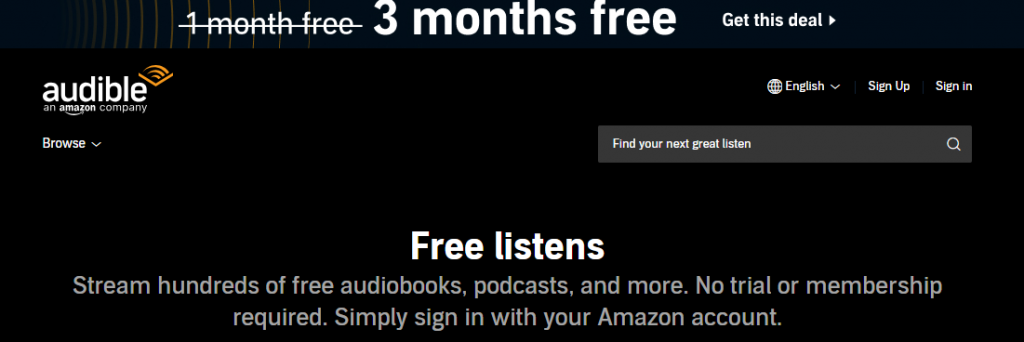
So to be clear, there are free audiobooks on Audible, and free Audible narration on Amazon, but you have to pay to access audiobooks in Spotify Premium.
“Costing nothing, or not needing to be paid for.”
Yet Nicola Solomon whines bitterly, “The Premium catalogue is free.” How did Solomon ever get to be CEO of a writers organisation when she does not understand what a simple English word like “free” means?
Let me help you out here, Nicola. This is how the UK’s Cambridge Dictionary describes “free“ in this context:
“Costing nothing, or not needing to be paid for.”
The Spotify website offers a free and a paid option. The paid option, a bundle called Spotify Premium, is where the audiobooks are available, and for access to this Premium bundle Spotify charges a “price” (Spotify’s own words), namely $10.99 per month. There’s a clue in the word Premium, but clearly Solomon’s English is still struggling with single-syllable words like price and free, so let’s help her out.
Here’s how the Cambridge Dictionary describes “price“:
“The amount of money for which something is sold.”
In other words, Spotify is selling a bundle. The only free element is the Premium deal with audiobooks is the x-days free trial, after which your card or other payment option will be deducted each month for the service received.
Okay, let’s move on. Spotify Premium now includes audiobooks, and has done since late last year. So how’s it going? Are authors and publishers actually getting paid? And if so, what’s the deal?
Back in October 2023, David Kaefer, Spotify VP Business Affairs, said smaller publishers would be paid a percentage share of the total revenue based on consumption. That would be the pooled or pot model that bigger publishers generally have steered clear of.
Kaefer added, “Every deal we have is a model that the industry’s already used. They’re not some new wild approach.”
It seems Hachette and Hachette and HarperCollins have put their entire audio catalogues into Spotify, while others like Macmillan only provided a selection. Absent indications otherwise, I’m assuming that incudes PRH.
Pan Macmillan said at that time that it is “always interested in opportunities to sell more of our licensed audio product,” adding “we have carefully reviewed our contracts, only making titles available to Spotify where we are cleared for distribution as streamed audiobooks. We are excited by the possibility of Spotify opening up new audiences for audiobooks.”
And so far all indications are that new audiences are indeed being opened up by Spotify.
Spotify grew the market rather than cannibalise Audible and Apple
The New York Times, when it is not busy suing OpenAI, still finds time to come up with some useful insights into the wider world, and it ended January referencing Bookstat’s assertion that without Spotify, the US audiobook market grew 14% YoY in Q4 2023, but with Spotify that growth hit 28%, meaning Spotify helped double market growth, and grab 11% of market share, putting it ahead of Apple.
The NYT quotes Bookstat as saying Spotify “grew the market rather than cannibalised existing Audible and Apple customers.”
More recently, Spotify has itself said it “had added 28 million users in the quarter, its second-biggest gain in company history. The service now has 602 million users, over 236 million of which are paid subscribers with access to the audiobooks service.”
Hey, Nicola, did you see that word “paid” in there? So not free, got it?
And BTW, 236 million is considerably more than the 46 million paying subscribers on Audible’s books. And the forecast is 239 million by end Q1 2024. No wonder Bob Carrigan is twisting himself into a pretzel over the new competitor.
So more than 236 million people are already paying Spotify for a Premium bundle that includes audiobooks. But still the whiners whine.
So far Spotify has revealed “only” about 90,000 audiobooks had been consumed, but has also said that “tens of millions” of dollars have been paid out amid “exponential sales growth.“
Given the history of PRH, the commentary from Amanda D’Acierno, president and publisher of Penguin Random House Audio, is perhaps the most telling: “What we’ve seen here in the U.S. is very, very good. They’re reaching people who don’t go to bookstores often.”
Search more widely and there are any number of positive reports from book publishing industry insiders about the Spotify audiobooks results so far.
Music streaming? it’s been a total disaster. If you hold this chart upside down, that is.
But still we have the same old nonsense repeated by subscription opponents about how Spotify decimated the music industry.
As noted in the previous op-ed, ever since streaming became a thing in the music industry, it’s been a total disaster. If you hold this chart upside down, that is.
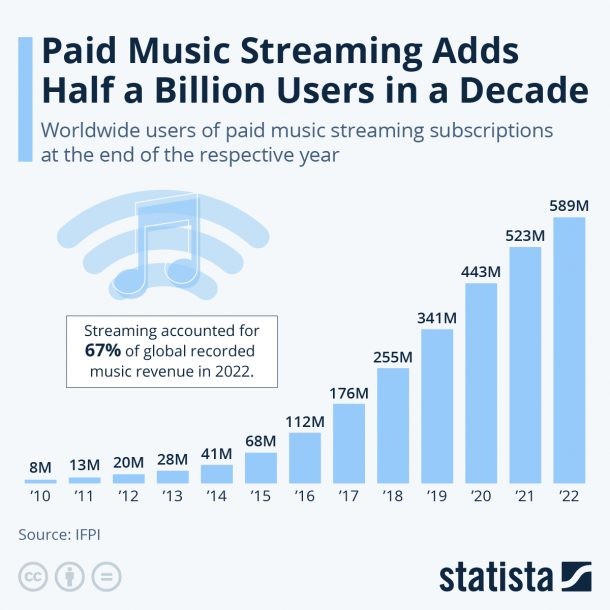
Over the years Spotify has been operational, it has paid out around $40 billion to the music industry, and in 2022 accounted for around 20% of all music revenue, with $3 billion of that $40 billion paid over in just the past two years.
In 2020 publishing rights holders generated $3.5 billion from music streaming overall (not just Spotify), “more than publishing revenue from CDs and downloads in any year in the 21st century so far, even at the peak of the CD era.”
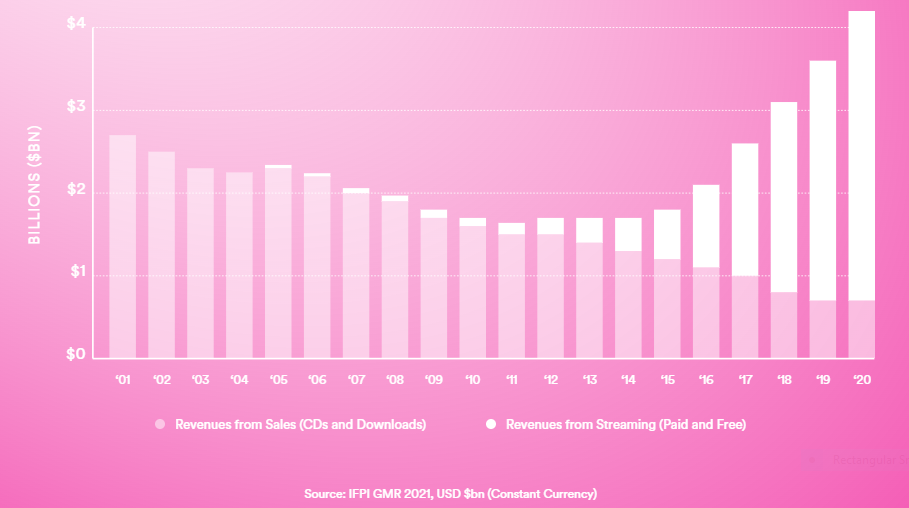
Spotify opponents will scream that Spotify is not paying musicians enough to live on, but actually Spotify pays over almost 70% of its revenue.
The key point here being Spotify pays that cash to the rights holders who put the content on Spotify. As Spotify explains, the rights holders “then pay the artists and songwriters, based on the agreed terms. These rights holders include record labels, publishers, independent distributors, performance rights organizations, and collecting societies. Spotify does not pay artists or songwriters directly.“
With that in mind, let’s give Spotify fair crack at the audiobook whip before declaring the sky has fallen.
This post first appeared in the TNPS LinkedIn Pulse newsletter.

